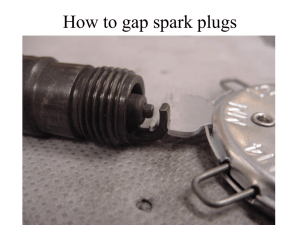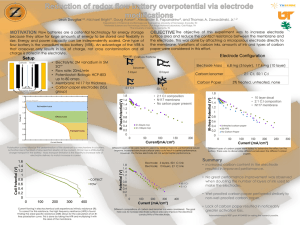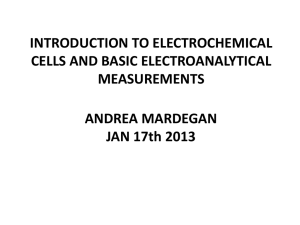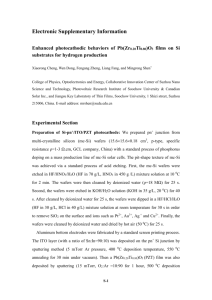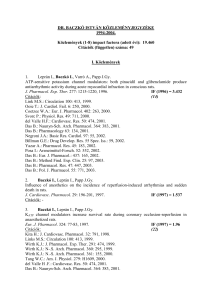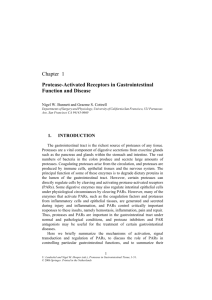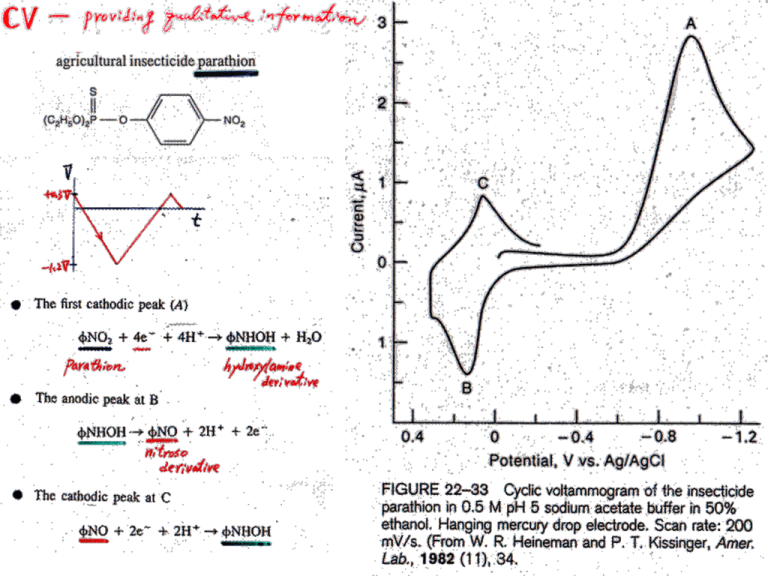
Single Cell Analysis with an Integrated
Electrophoretic/ Electrochemical Chip
Ching-Yu CHANG 1, 2, Tatsuya MURATA2, Yasufumi TAKAHASHI2, Ryota KUNIKATA2,
Hitoshi SHIKU2, Hsien-Chang CHANG1, Tomokazu MATSUE2*
1-Institute of Biomedical Engineering, National Cheng Kung University, Tainan 701, Taiwan
2-Graduate School of Environmental Studies, Tohoku University, Sendai 980-8579, Japan
conductive substrate
redox recycling
S
catalyze
Pred
Poxi
secretion
cell
Oxidation current
electrode
Electrochemical Single Cell Measurement
Interference: + +
SNR: -
Signal level: -
Interference : -
SNR: +
Signal level: +
Interference: + +
SNR: -
Signal level: -
Interference: - -
SNR: + +
Signal level: + +
Micro Well Structure
100 mm
30 mm
5 mm
15 mm
LFVA
(low flow velocity area)
25 mm
Active vs. Passive Single Cell Trap
Passive
Active
electrophoretic or
dielectrophoretic force
addressable,
limited scale
trapping force
gravity or hydraulic force
cell placement
random, large scale
Stabilization for the
trapped cell by
no additional force applied
keeping on the voltage
biocompatibility
good
concerns about the applied
electrical field
cell array
one kind
hybrid
How to take
advantages of
active and
passive traps?
Chip Design
30
mm
SU- 8
ITO
Pt
30 mm
25
mm
+
-
+2.0 V
tape
SU-8
electrode
Trapping solution: 0.2 M sucrose
Trapping voltage: 2.0 V vs. ITO
Cell Manipulation
Electrophoretic trapping
- 2.0 V
-
+
Hydraulic flush
Electrophoretic repelling
+ 2.0 V +
-
Top View
Steady-state Currents for Microelectrode
i
Ilim
I lim 4nFDCr
E
disc electrode
4nFDCr
I lim
4 L r
parameters
n: transferring electron / molecule
F: Faraday constant
D: diffusion constant
C: substance conc.
r: electrode radius
L: recessed depth
recessed disc electrode
Analyst, 2004 (129) 1157-65
Model for Recessed UME on a Conductive Substrate
a b ln H c(ln H )2 d (ln H )3 eL fL2
IT
iT , 1 g ln H h(ln H )2 i (ln H )3 jL kL2
iT
a
1.79862
g
l
r
0.67767
b
0.40135
c
0.16349
h
0.17304
d
0.1994
i
j
0.015745
2.01384
e
1.79815
f
0.38238
K
0.33559
d
conductive substrate
normalized parameter
H=l/r, L=d/r
redox
UME
Chip Electrode
Anal. Chem., 2007 (79) 5809-16
Micro Well Electrode Validation
< 30 mm
5.5 nA
7.8 nA
4πnFDCr2
I lim
4 L πr
scan rate: 10 mV/sec
2E configuration, Ag/AgCl as RE+CE
5 mM K3Fe(CN)6 / 0.1 M KCl
scan direction: 0.6 0 0.6 V
~ 12.9 mm
L=23 mm
I T = 1.07 (theoretical)
I T =7.8/5.5= 1.42
Measurement of Secreted Alkaline Phosphatase
SEAP
p-aminophenylphosphate (PAPP)
p-aminophenol (PAP)
0.3 V vs. Ag/AgCl
NH2
HO
NH2
O
0.1 V vs. Ag/AgCl
+ 2H+ +2 e-
p-iminoqulnone (IQ)
PAP
ITO electrode
PAPP/HEPES
diffusion
PAP
PAPP
IQ
diffusion
PAP
PAP
IQ
SEAP
recombinant HeLa
Pt electrode
SEAP: secreted alkaline phosphatase
e-
Redox Recycling on ITO Electrode
detection voltage
Dot line
RE+CE
ITO
PAP
WE
Solid line
RE+CE
WE
PAPP
Measuring condition
PAP 4.7 mM /HEPES (line a &b)
PAPP 4.7 mM /HEPES (line c &d)
HEPES buffer: HEPES 20 mM, NaCl 153
mM, KCl 5 mM, glucose 5 mM, pH 9.5
scan rate: 20 mV/sec
scan direction: 0 0.6 0 V
ALP-Bead Preparation
+ 0.3 V vs. Ag/AgCl
n=3
UME
wash with HEPES,
suspend in 2.35 mMPAPP
ALP (0.6U/mL) / HEPES
overnight incubation
RE+CE
particle
descending
latex bead: 10 mm
HEPES: pH 9.5
Single ALP-Bead Measurement
iPAP depletion
PAPP
ibare iblk i PAPP
bare bead
PAP
i ALP i PAPP i PAP
ALP bead
Real-time SEAP Secretion Monitoring
SEAP Cell
Micro well
PAP calibration curve
Conclusion
Cell can be trapped and repelled by electrophoretic force.
Micro well structure can provide a LFVA to stabilize the
trapped cell during solution change.
ITO electrode provide a conductive surface for redox
recycling and then enhances the response current.
The real-time non-continuous SEAP secretion was
observed by this device.
Thanks for your attention …
Entrapment and measurement of a biologically
functionalized microbead with a microwell electrode
Ching-Yu Chang, Yasufumi Takahashi, Tatsuya Murata, Hitoshi Shiku,
Hsien-Chang Chang* and Tomokazu Matsue* Lab Chip, 2009, 9, 1185–92
1 M H2SO4
1 M NaOH
Pd微粒電析於GC表面之電位窗
不同電位電析Pd粒子於GC電極上的型態
電極 1
電極 2
電極 3
電極 1
電極 2
電極 3
電極 4
循環伏安法電析Pd粒子在SnO2電極上的型態
步階電位法電析Pd粒子在SnO2電極上的型態
電化學法測量不同Pd粒子表面型台的面積
電位階昇法:不同電透析條件下Pd(GOD)/GC電極於PBS(pH 7.4)中的循環伏安圖
酵素電極偵測葡萄糖的檢量線
Amino Acid
Structures
http://www.cem
.msu.edu/~cem
252/sp97/ch24/
ch24aa.html
Amino Acid
a-carboxylic acid a-amino Side chain
Alanine
Arginine
Asparagine
Aspartic Acid
Cysteine
Glutamic Acid
Glutamine
2.35
2.01
2.02
2.10
2.05
2.10
2.17
9.87
9.04
8.80
9.82
10.25
9.47
9.13
Glycine
Histidine
Isoleucine
2.35
1.77
2.32
9.78
9.18
9.76
6.10
Leucine
Lysine
Methionine
2.33
2.18
2.28
9.74
8.95
9.21
10.53
Phenylalanine
2.58
9.24
Proline
2.00
10.60
Serine
2.21
9.15
Threonine
2.09
9.10
Tryptophan
Tyrosine
Valine
2.38
2.20
2.29
9.39
9.11
9.72
12.48
pKa Values of
Amino Acid
3.86
8.00
4.07
http://www.cem.msu.
edu/~cem252/sp97/c
h24/ch24aa.html
10.07

